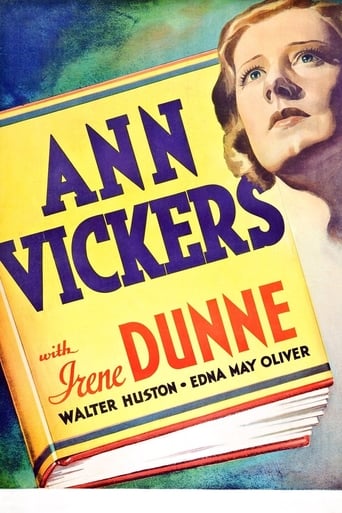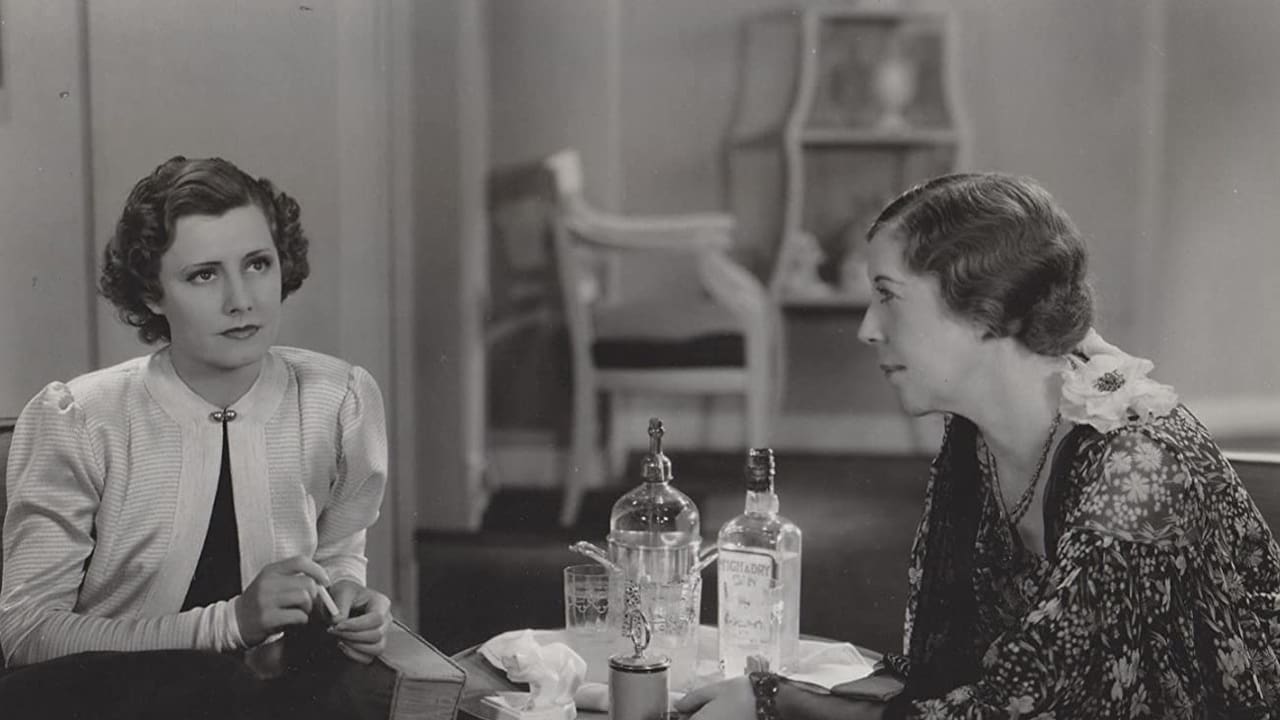bkoganbing
Essaying the title role in Ann Vickers, Irene Dunne who was never less than noble on screen manages to make a virtuous woman out of someone who has two illegitimate kids. Even in the days before the Code this was pretty heady stuff for Hollywood to be coming out with. Then again, novelist Sinclair Lewis was never anything but controversial in what he gave the American public. In fact his own relationship with newspaper columnist Dorothy Thompson parallels the one that Dunne has with Walter Huston in the film.We first meet Ann as a social worker at a settlement house before World War I where she has eyes for one special doughboy, Bruce Cabot even with lawyer Conrad Nagel panting hot and heavy for her. Cabot proves to be something of a rat and impregnates her, but the child is a stillborn.Ann is a role model feminist, a former suffragette who went to prison for the franchise. She's a career person first and she moves on to various jobs in the penal system, including running a women's prison. She becomes a best selling author and eventually falls in love with married judge Walter Huston with whom she has another child. Then Huston gets himself in a jackpot, but Irene also stands by her man. I've not read the Sinclair Lewis novel, but just viewing the film you could tell an awful lot was left out. Possibly a great deal of this film wound up on the cutting room floor. Edna May Oliver has a fine part as Dunne's mentor, but she's abandoned a third of the way through the film and we don't know what happened.Dunne does well in a role that Katharine Hepburn would have hit a home run with and she does get good support from the rest of the cast. Still this abbreviated version of Sinclair Lewis leaves a lot to be desired.
Michael_Elliott
Ann Vickers (1933) ** (out of 4) Static version of Sinclair Lewis' play has Irene Dunne in the title role of a social worker who gets dumped by an American soldier (Bruce Cabot) and then puts all her attention on her work. She eventually falls for a controversial judge (Walter Huston) but this here might cost her everything she's worked for. This RKO film was produced by Merian C. Cooper the same year he made King Kong but that's the only thing the two films have in common. Dunne is good in her role but the film is all over the place and it's easy to see that the film is trying to cover several parts of the book but can't take everything in within the short running time. Huston stays under control and gives a winning performance as does Cabot and Conrad Nagel in his supporting role. Edna May Oliver and J. Carrol Naish also have small roles.
samhill5215
This film starts out wonderfully. The protagonist, Ann Vickers, is an independent woman, a suffragette pursuing a career, a woman who knows her mind and is determined to lead a life without a man's stamp of approval. She even has two illegitimate children. For 1934 this was definitely forward thinking, even dangerously revolutionary. And so the first half of the film goes on this vein with Ann being refreshingly modern. I suspect that many women viewers identified with her dreams and struggles.And then the story grinds to a halt and Ann's life comes apart, and all because her lover, a corrupt judge, is convicted and sent to jail. When she is forced to abandon her career it is made eminently clear that she owed her success to her once influential lover. All her hard work amounted to nothing once her powerful protector disappeared. Moreover, she betrays her own ethical standards by pleading for her lover's freedom. So the implication is that love is the paramount motivating factor in a woman, and Ann is reduced to a stereotype. She even waits for her man to get out of jail and learns to cook for him.Frankly I felt betrayed. I became involved in this woman's life and cheered her on only to discover that Hollywood lacked the courage to present a truly alternative lifestyle. I guess I shouldn't have been surprised. After all 1934 was the year the dreaded morality code went into effect. Still, "Ann Vickers" would have been a much better film if they had left well enough alone.
MartinHafer
This is a bad film, as its central message is very muddled and the plot seems like it was the result of merging several disparate scripts. As a result, it often makes absolutely no sense at all and certainly is not a film Miss Dunne or Mr. Huston should have been proud of making. However, the film IS worth watching if you are a fan of "Pre-Code" films because it features an amazingly sleazy plot that strongly says that nice girls DO put out--even if they aren't married and even if their partner IS!! The film begins with Miss Dunne as a social worker assisting troops heading to Europe for WWI. In the process, she meets a scalawag (Bruce Cabot) who eventually convinces her to sleep with him. She becomes pregnant and he then goes on to the next unsuspecting woman. However, Miss Dunne does NOT want him back, as she realizes he's not worth it, but later her baby dies at child birth. While all these very controversial plot elements are used, they are always alluded to--almost like they wanted the adults in the audience to know but hoped that if they phrase it or film it in just the right way, kids in the audience will be clueless (after all, films were not rated and kids might attend any film at this time).Surprisingly, this entire plot involving a stillborn baby and Cabot ends about 1/4 of the way through the film and is never mentioned again or alluded to. It was as if they filmed part of a movie and abandoned it--tacking it on to still another film. In this second phase of the film, Miss Dunne unexpectedly begins working at a women's prison (though we actually never really get to see her doing anything there). What we do see are countless horrible scenes of severe abuse and torture that were probably designed to titillate. And, as a result of all this violence, Miss Dunne goes on a crusade to clean up the prison and becomes a reformer and famous writer.But then, out of the blue, another type of film emerges and the women's prison reform business goes by the wayside. Dunne meets a judge (Walter Huston) who is married but he desperately wants her. Now throughout the film, Dunne is portrayed as a very good girl--even though she did have unmarried sex with Cabot (she was more or less tricked into it). But now, single Irene, who is a tireless reformer and good lady begins sleeping with a married man. He tells her that he and his wife are estranged and are married in name only, but she never thinks to investigate if this is true, and with his assurance, off flies her clothes and they are in the baby making business! BUT, while she's pregnant with his love child, he's indicted for being a crooked judge. He assures her he's innocent, but he's convicted and it sure sounds like he's a scoundrel--using inside information from people that have come before his bench in order to amass a fortune. Then, in the final moments of the film, Miss Dunne tries in vain to get him freed and vows to wait with the child until Huston is released. The film then ends.So, we basically have three separate films AND a bizarre early 30s idea of what a nice girl should be like. I gathered that she should be a strong-minded working girl who instantly becomes an idiot in her personal relationships! This really undoes all the positives about Dunne's character and it's really hard to imagine anyone liking the film. A strong women's rights advocate might easily be offended at how weak-minded and needy she was and religious people might see her as totally amoral or at least morally suspect! With a decent re-write, this could have been a good film or at least interesting as a lewd and salacious film, but it couldn't make up its mind WHAT it wanted to be and was just another dull Pre-Code film.


 AD
AD


